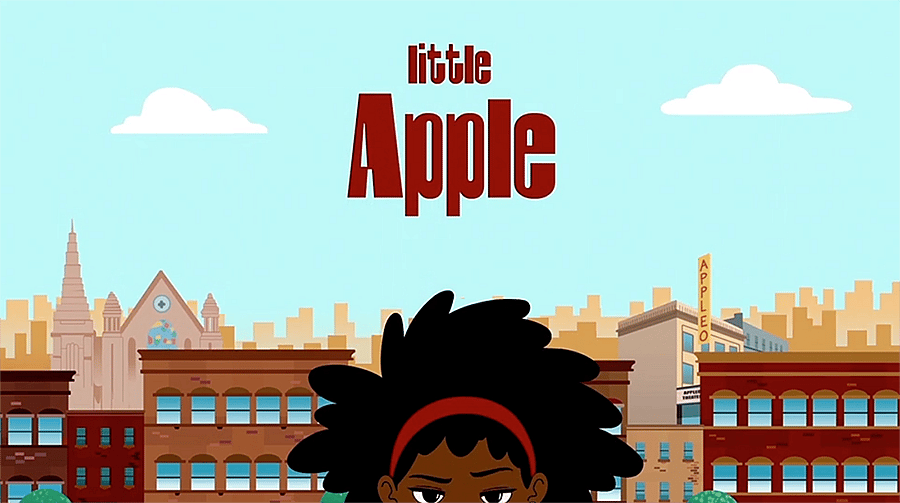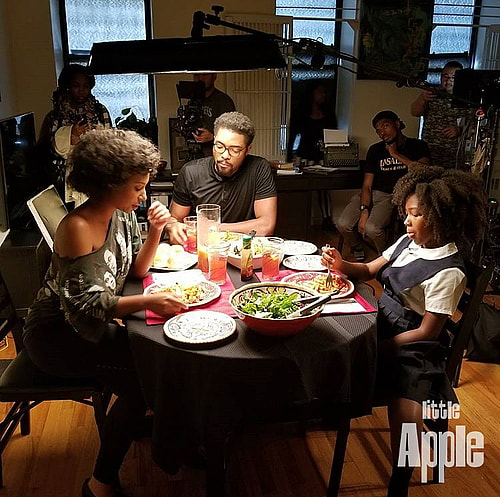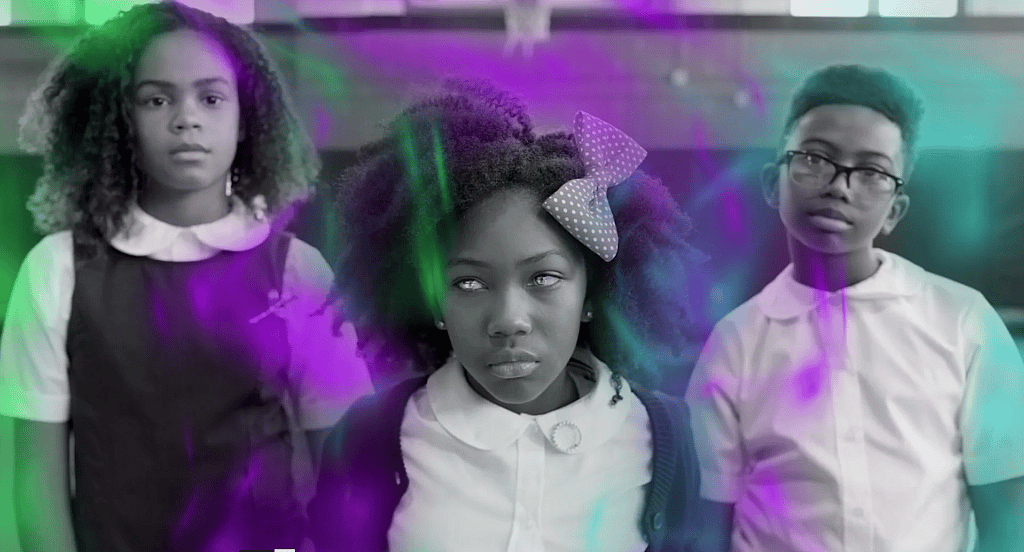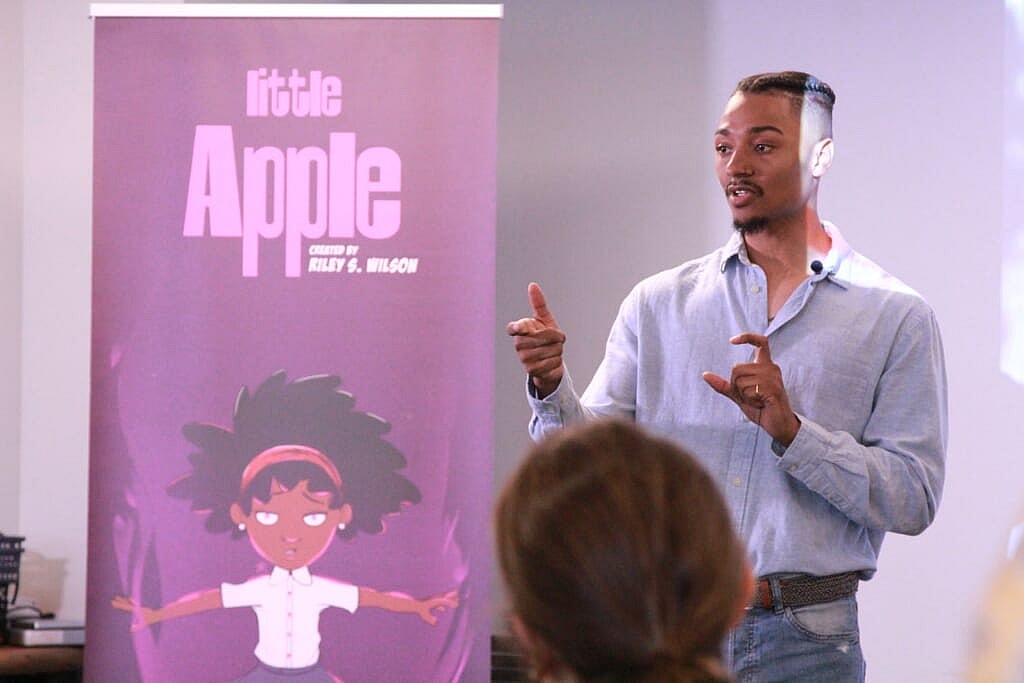Harlem, USA, has been the breathing ground for Black culture and lifestyle since the Harlem Renaissance of the 1920s and 30s. Thanks to staple locations such as the Apollo Theater, Sylvia’s Restaurant, and Malcolm X’s Shabazz Center, you couldn’t walk a block without feeling that energy that these Black innovators and creatives laid down before us.
That was until gentrification. Gentrification shows up like a thief in the night and refuses to leave without wiping Harlem of the spirit that once made it so special. That was until Harlem found its own superhero who refuses to lose her neighborhood to gentrification and systemic racism.
Thus, Little Apple was born.

Read More: Queer Harlem Renaissance: Short films highlight LGBTQ contributions to culture
The sci-fi/drama web series, Little Apple, follows the story of a nine-year-old black girl from Harlem as she deals with her growing consciousness, her changing neighborhood, and her newly discovered superpowers. Accompanied by a comic book of the same name, we explore gentrification, Black feminism, microaggressions, and Black girl magic through the eyes of Apple— the superhero we all so desperately need.
theGrio sat down and spoke with the creator, director, and executive producer Riley Wilson about his inspiration behind telling this complex story from a child’s experience, Little Apple’s influence within NYC’s schooling system, and what we can all learn from this new age superhero.
theGrio: What was the inspiration behind Little Apple?
Riley Wilson: There were a few critical things that impacted my decision to make Little Apple. For one, I have a little sister. When she was young, like 9 or 10, I remember a video of this girl from South Carolina being physically assaulted in her classroom. I was seeing so much content where we were not in control, we were victims, we were assaulted and killed, even.
The media has an obsession with Black death, Black hurt, and Black trauma. I wanted to create something that would be the antithesis of that. Something that could match on the opposite side of how we feel when we watch that trauma. I wanted to create content where Black kids can speak unapologetically without fear. I wanted to create positive content that could also live in the digital ethos.
tG: Apple is beautiful, intelligent, and unapologetically herself. And her parents not only encourage it but support her! That’s truly refreshing to see. What message do you hope little Black girls see when watching Apple?
RW: I hope that they see power. I hope they see that the power comes from within and that these macro ideas of oppression and systems and all of these terms are very large but in everyday situations, you can overcome them. Whether it’s at the elevator, walking down the street, or in the classroom, you have the power within to overcome these situations. Sometimes you may not see the community that supports you in your efforts, but you have community.

tG: Episode one taps into gentrification specifically in Harlem. Why did you choose that particular city to tell Apple’s story?
RW: I’m from South Carolina, but I’ve been a New Yorker for a decade. Harlem is a very special place and when I first came here– still in the same apartment that I first moved in– the first thing I did was a walking tour. If you understand what Harlem represents, you know that it’s a beacon for the Black experience. It has a direct connection to the root of us. I felt like there was an opportunity to dig in deeper into the experience of a Harlem resident and a Harlem family and what’s happening.
One walk around the block and you’ll see that Little Apple is one of these kids. In the comic book, it says there’s this invisible thread where we as folks who share a similar experience understand. For example, when I screen Little Apple in school, these kids are like 8 to 13. They already know what it is for someone to invade your space. They know what it is to have agency and opinion. So in the scene when Little Apple is at the elevator and that white man invades her space, I can’t tell you how many times children point that out.
tG: Apple’s superpower wasn’t her entire being, just a small part of her existence. However, being a black kid in America, our survival instinct and ultra awareness is our actual superpower. Was that done on purpose?
RW: Absolutely! I have the most fun creating stories that are in the near future. It looks like this person could be living beside us but they’re different and somehow still similar. I also didn’t want her to feel unattainable. I wanted her to be super but I wanted to keep her humanity and that childlike innocence. Our producer Okema T. Moore explains it beautifully…we did the extra work to make sure she still appeared as a little Black girl.

tG: You’re currently working on season 2. What else can we expect from Little Apple?
RW: Little Apple is apart of a universe. Our content is sci-fi and drama with comedy and our intention is to create content that centers the black experience from an Afro-futuristic lens.
Part two will be Apple, played by Milan Williams, tapping into her powers more. The way it is written and filmed, you’re dropping into Apple’s life. She already knows what’s going on in her life and you need to catch up. Part two is getting more into Apple’s origin. Like, where did she get her powers from and who she gets her power from and we witness the stakes get higher for her.
Being the autonomous little girl that she is, she’s taking matters into her own hands. She’s leaning into her powers but the question is, is she doing too much?

Wilson, who also serves as chief creative for ATS.4 Productions, is a Department of Education vendor who provides televised programming, racial and social justice curriculum, and comics to New York City schools.
From their first viewing at Harlem’s Schomburg Center in front of 300 people, Wilson and Little Apple have gone from appearing in school’s curriculum programs across NYC to film festivals such as American Black Film Festival and The International Black Film Festival.
Wilson moves with the intention to become a leader in both sci-fi animation when it comes to centering Black hope.
“We grew up with the same formula of child content that needs a stronger representation of what the Black experience really looks like. Black Panther reignited the fire but it’s not rooted in a Black American experience and people are still looking for it,” Wilson shares.
On a life journey to becoming a leader who tells these stories centered around black hope, Wilson is also intentional on the support system along the way. All of Little Apple‘s advertisers are Harlem based companies and they pride themselves on aligning with organizations that support this type of intentional content.
Wilson is currently working on his next project called Cookie Crunch Club. The animated series will deal with contextualizing the defunding of the police movement for children.
You can watch the entire first season of Little Apple on YouTube here. Check out the trailer below:
Have you subscribed to theGrio’s podcast “Dear Culture”? Download our newest episodes now!
TheGrio is now on Apple TV, Amazon Fire, and Roku. Download theGrio today!

